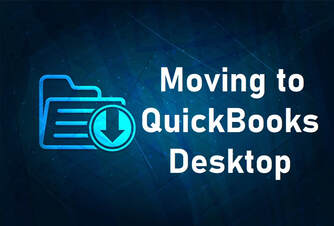In Pursuit of Profit
Read our expert article below or sign up to get articles sent to your inbox.
 While many experts have been quite vocal about the benefits of moving to a cloud-based accounting platform like QuickBooks Online there are far fewer resources available for companies that are looking to make the switch in the other direction. Of course, businesses with outdated locally hosted accounting platforms can reap the benefits of migrating to a regularly updated accounting software with anywhere, anytime access. But what often gets overlooked is the scenario that some growing companies face when their needs begin to outpace the functionality QuickBooks Online (QB Online) offers. QuickBooks Desktop (QB Desktop) is a robust accounting platform offering added bookkeeping functionality that is essential in some industries. So, what do you need to know when switching from QB Online to QB Desktop?
Understanding The Differences QuickBooks is the most well-known name in accounting software these days, and with their extensive lineup of accounting software options it is no wonder why! No matter what a company’s needs are, QuickBooks has a solution to meet those business needs at various price points based on how it will be used. A tiered pricing structure based on the number of users and number of accounts across both QB Online and QB Desktop ensure that companies are not overpaying for their specific needs. So, what makes them different? When it comes to how QB Online and QB Desktop differ, the primary advantage of using QB Online is convenience and ease of access among dispersed users, while the primary advantage of using QB Desktop is robust functionality and an array of industry-specific features. Bookkeeping information in QB Online can easily be shared with your accountant in real-time and accessed from any internet-connected device. It has a user-friendly interface and connects to various apps. Small businesses typically use QB Online because their bookkeeping needs are less complicated than their larger counterparts. Working with your accountant on QB Desktop is not as seamless because an accountant’s copy of your books must be saved and sent to your accountant and uploaded back into the system after changes have been made. However, working within the interface itself is very intuitive, making for a user-friendly experience across an even wider range of functionality. For experienced accountants doing bookkeeping tasks at scale, QB Desktop is a huge time saver because doing so does not rely on internet speed. Where QB Desktop really shines is in the areas of inventory tracking and reporting. Advanced functionality makes QB Desktop the go-to solution for job costing and inventory management. For manufacturers, wholesalers, retailers, service providers, construction companies, and contractors there is added industry-specific inventory functionality to track available stock, change prices, manage reorders, scan barcodes, and set up sales-related automation. These features are crucial in determining profitability at the product, service, project, channel, or client-level. Additionally, QB Desktop allows for accounts payable management and forecasting on higher level plans as well to round out its suite of offerings. Key Considerations Before switching accounting systems, ask your team the following questions:
Anticipating Friction Points To move to QB Desktop you will need to ensure all of your users’ computers meet the requirements necessary to do so. If their technology is not compatible with these requirements or not currently sufficient to meet them, they will need to remedy those issues before moving forward (this may mean upgrading to a newer version of Windows or adding additional RAM or disk space). Once you have that squared away, you can start thinking about how your data will migrate over. QB Desktop is a highly scalable accounting solution, which makes it a great choice for growing businesses. However, migrating over from QB Online requires fitting your accounting data into slightly different software parameters (much like upgrading to a newer version of QB Desktop), which can be a headache. Messy financials, poorly structured accounts, or quirky setups can become problematic when they are switched over, necessitating a lot of manual work to clean them up. Even when everything is set up correctly migration processes can get very complex with large volumes of data, requiring the help of experienced accounting personnel to bring everything over correctly and avoid downtime. Keep in mind, some items (ex. reconciliation reports, multi-currency transactions, estimates, and vendor notes) will not migrate from QB Online because they are not compatible with QB Desktop, so you should familiarize yourself with what does and what does not migrate over when switching to QB Desktop. Plan for how you will manage the information that does not come over if it is critical to your business, and decide how much time you will need to devote to manually inputting this information after the migration. Getting Help When you are migrating from QB Online to QB Desktop, you do not have to manage the process alone. Seeking accounting migration help externally offers not only the breadth of experience needed to provide helpful guidance during a platform change, but also the kind of impartiality needed to make beneficial accounting decisions along the way if problems arise. Even if you have a dedicated accountant, bringing in extra help during the transition is always a shrewd decision. Leaning on a team of project-based accountants provides the staff-hours needed to oversee a change of this magnitude. Contact us to find out how we can assist with moving your QuickBooks files when migrating to QuickBooks Desktop. |
SUBSCRIBE:DOWNLOAD:DOWNLOAD:Categories:
All
Archives:
July 2024
|
Services |
Company |
|
6/3/2022